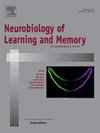Memory formation following appetitive conditioning is variably dependent on retinoid signaling
IF 2.2
4区 心理学
Q3 BEHAVIORAL SCIENCES
引用次数: 0
Abstract
Retinoic acid (RA), the metabolite of Vitamin A, plays an important role in central nervous system development and regeneration, as well as learning and memory in vertebrates. We have previously shown that RA signaling is also important for consolidation of long-term memory (LTM) in the invertebrate mollusc, Lymnaea stagnalis, following operant conditioning of the aerial respiratory behaviour. Here, we examine whether retinoids also play a role in classical reward conditioning in this mollusc. A single-trial appetitive conditioning paradigm was used, with amyl acetate as the conditioned stimulus (CS) and sucrose as the unconditioned stimulus (US). This produced an acquired conditioned response whereby the animal exhibited a feeding response to amyl acetate. A single-pairing of CS with US produced long-term memory at both 1d and 6d after training. Pharmacological treatments that disrupt RA signaling did not block the formation of long term memory when a 6-day food deprivation period was implemented before training. However, two different paradigms induced susceptibility of the conditioned response (memory) to retinoid signaling inhibitors. The first paradigm change involved using a shorter, 3-day food deprivation period in order to reduce motivational drive to feed, whereas the second paradigm manipulation reduced the strength of the unconditioned stimulus (sucrose). These findings suggest different susceptibility of memories to retinoid inhibition, depending on shifts in both external parameters of the experiment, as well as internal motivational states of the animal.
食欲调节后的记忆形成不同程度地依赖于类视黄醛信号。
维甲酸(RA)是维生素 A 的代谢产物,在脊椎动物的中枢神经系统发育和再生以及学习和记忆中发挥着重要作用。我们之前已经证明,在无脊椎软体动物长春花中,对空中呼吸行为进行操作性条件反射后,视黄酸信号对巩固长期记忆(LTM)也很重要。在此,我们研究了视黄醇是否也在这种软体动物的经典奖赏条件反射中发挥作用。我们采用了单次食欲条件反射范例,以醋酸戊酯作为条件刺激(CS),蔗糖作为非条件刺激(US)。这产生了一种获得性条件反射,即动物对醋酸戊酯表现出摄食反应。CS与US的单一配对在训练后1d和6d都产生了长期记忆。如果在训练前实施为期6天的食物剥夺,破坏RA信号传导的药物治疗并不能阻止长时记忆的形成。然而,两种不同的范式诱导了条件反应(记忆)对视黄醇信号抑制剂的敏感性。第一种范式的改变涉及使用较短的 3 天食物剥夺期,以减少进食的动机驱动,而第二种范式操作则降低了非条件刺激(蔗糖)的强度。这些研究结果表明,根据实验外部参数和动物内部动机状态的不同,记忆对视黄醇抑制的敏感性也不同。
本文章由计算机程序翻译,如有差异,请以英文原文为准。
求助全文
约1分钟内获得全文
求助全文
来源期刊
CiteScore
5.10
自引率
7.40%
发文量
77
审稿时长
12.6 weeks
期刊介绍:
Neurobiology of Learning and Memory publishes articles examining the neurobiological mechanisms underlying learning and memory at all levels of analysis ranging from molecular biology to synaptic and neural plasticity and behavior. We are especially interested in manuscripts that examine the neural circuits and molecular mechanisms underlying learning, memory and plasticity in both experimental animals and human subjects.

 求助内容:
求助内容: 应助结果提醒方式:
应助结果提醒方式:


